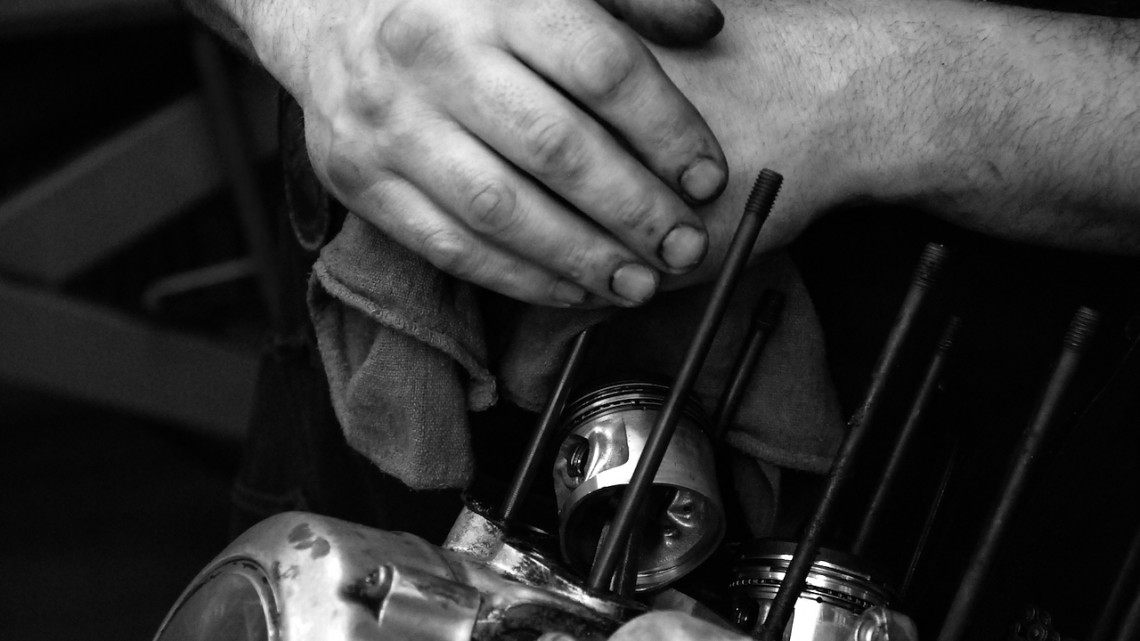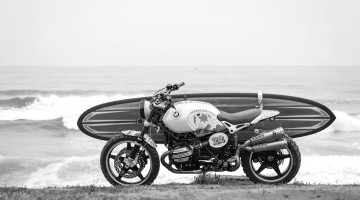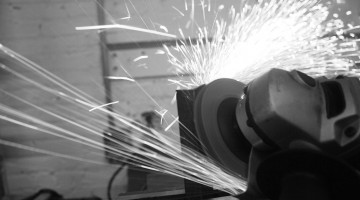As a custom bike builder, what I’m about to say is a certain type of heresy, but it needs saying. I find the now ubiquitous saying/mantra/hashtag of “built not bought” ridiculous. What’s worse, I think the underlying attitude is working against what so many in the custom bike scene are trying to achieve. That is, “built not bought” is making it harder than it already is for custom builders to make a living. Not DIY, mind you, but the dishonest attitude at the roots of “built not bought.” As such, I also think it works against all the fantastic aftermarket parts suppliers who help us create these machines in the first place.
By making this the mantra of the day, we alienate two critical groups of people. The first is the builders, and the second is their would-be patrons. The problem with “built not bought” lies in the implied shame of anything “bought.” If I bought my bike instead of building it myself, it’s somehow less, no matter how unique or remarkable it happens to be. Somehow that motorcycle is not valid or “legit” unless I turned every nut and bolt with my own two hands. In that light, “built not bought” is a much deeper, much uglier sentiment than say “stock bikes suck.” Of course, this also has its caveats. The new Indian Scout comes to mind.
There has to be a better way to celebrate personal craftsmanship and DIY ingenuity without turning it into “us vs. them” right?
The problem here is obvious, at least to me. Instead of encouraging a culture of builders and patronage, this mantra passive-aggressively shames people for not having the time, equipment, skill or desire to build a custom bike themselves. It then also punishes those builders who do have all those things and want nothing more than to build amazing machines for other people to buy. If I own an amazing bike, that should be enough. It shouldn’t matter where it came from — be it the factory, the studio of a master builder, or my own garage.
Yet the even more insidious, more bullshit aspect of “built not bought” is how often it’s trotted out by aftermarket parts suppliers. This is terrifically ironic because I’m literally buying parts from them to create my “built not bought” project. (How does this not ultimately work against them too?) If the core ethos here is that I should do everything myself, then why would I buy factory-made turn signals and other bolt-on farkle from any one of a dozen retailers currently trying to ride the “built not bought” wave? If I’m a “real” craftsman, shouldn’t I be machining my own indicators? Shouldn’t I be soldering my own LEDs? Hell, if I’m going to be completely “legit”, I should build my frames and engines from scratch too, right? I’d better go buy that secondhand Bridgeport mill I don’t actually know how to use. I should be blowing the glass for my own headlight bulbs and grinding my own lenses. Built not bought!
Why stop there? Why not sew my own leather jackets, or mold and cast my own helmets? Why not loom my own flannel and stitch my own vintage-inspired selvage denim on a 200-year-old trundle-powered sewing machine? Am I “legit” enough yet?
Now I’ll admit that I’m being pedantic. Obviously “built not bought” means different things to different people, and whoever originally coined the phrase probably didn’t mean it this way. And I know that parts suppliers (for whom I’m extremely grateful) are simply trying to sell their wares. Yet the phrase still bugs me. I think we can do better. We deserve better if for no other reason that “built not bought” is fundamentally dishonest. With extremely rare exception, every custom bike has components that were, in fact, bought. The cut-off point for what qualifies as “built” isn’t grounded in reality, because let’s face it, something on every custom bike was bought. Consequently, creative builders don’t get the credit they deserve unless their bike meets some subjective baseline of custom fabrication. Worse, would-be patrons are left to feel like posers, again, because they didn’t “build” their bike themselves. If we want the custom scene to have a future, this has to stop.
I’m exhausted by this romanticized vision of the starving artist builder toiling away under his side grinder, modifying select, esoteric details of an otherwise conventional motorcycle. Truth is, the most achingly beautiful franken-bikes to come out of builders like Deus, Classified, Revival, CRD and a dozen others are still a mix of bought, found and made components. Instead of pretending it’s all original, let’s celebrate what building a bike is really about: making great choices and ending up with a noteworthy machine. Let’s focus on results instead of pretending there’s only one “legit” path to creating a great motorcycle. Let’s stop pretending that effort for its own sake is noble or valuable.
There’s a certain contempt in “built not bought” towards the OEMs as well, which I find disingenuous and ultimately poisonous. If it weren’t for the Yamaha, that XS650 wouldn’t be there for someone to “build” in the first place. If Harley hadn’t produced that knucklehead all those years ago as a stock bike, there’d be no vintage Harley chopper scene.
You are not John Britten, and neither am I. None of us is building the entire buffalo here, so let’s get over ourselves.
It’s great to build, but it’s okay to buy things too. It’s essential, in fact. If we want the motorcycle industry, let alone the custom scene, to be in any way sustainable, this disingenuous attitude needs to be checked, and right now. The patron who buys a custom bike should be as celebrated as the craftsperson who builds it. After all, those owners are an elite set of exclusive buyers who own something special. Why are we somehow ashamed of buying motorcycles, custom or otherwise?
I don’t have a confident answer to this question, but I do have a hypothesis. The motorcycle scene, as I see it, is struggling with an “authenticity” problem. That is, there’s an obsession with portraying an “authentic” image when it comes to one’s bike and his or her biker persona. I could shorthand this as just another tired lament on how “hipsters are ruining motorcycling”, but I don’t think it’s quite that simple. (I also don’t think that’s true.) The trouble with today’s biker “authenticity” is just how unauthentic it actually is. There’s a pretense that requires the latest in vintage waxed cotton this-and-that, and people are, ironically, perfectly willing to pay artisan prices for such goods. Yet rather than celebrating a do-it-yourself attitude when present, this new authenticity demands that one essentially curate his or her motorcycle too, and if they don’t do it themselves, then it’s “bought” and that’s less authentic. We’ll buy artisan jeans, but not artisan motorcycles. That we have to do ourselves. I don’t get it.
At the heart of it, what bothers me most about “built not bought” is that it’s intrinsically negative and worse, cynical. It’s exclusionary rather than inclusive. It tears down the idea of buying something instead of actually celebrating personalization and skill acquisition when it happens. It ceases to be about results (that is, amazing custom bikes) and gets all wrapped up in arbitrary boundaries of what’s “legit” and “authentic” to the process. (I also think there’s a cheapskate component in this attitude that instead of appreciating value, tries to escape the real cost of things. If we want motorcycling to have a future, that attitude has got to stop too.)
So what instead? I think we need a new attitude. Or rather, I think we need to better tap into the core of our enthusiasm – at that thing that “built not bought” was trying to be but fails in its cynicism. This new sentiment might be more complicated than will fit neatly into a clever hashtag on Instagram or a sticker that comes along with my box of cafe racer parts, but it’s important nonetheless. Best of all, I think that if we consider this for just a moment, we’ll realize that what we really meant by “built not bought” didn’t have anything to do with where a bike came from, but instead was meant to celebrate the act of creation. So let’s do that. Let’s celebrate creativity.
That’s the stuff that gets my juices going. The joy is found in the process of creation, and in the skill acquisition that lets me do something today that I didn’t know how to do yesterday. Yes, let’s build our own machines, but let’s also build machines with others and for others. If we’re not builders ourselves, let’s patronize our favorite builders and parts suppliers so that they have a future. (One hashtag I do really like is #supporttheindependents.) Let’s celebrate the ownership experience as much as we celebrate unique motorcycles that need owners (and more importantly buyers) in order to keep being created. What if the sticker on the side of my bike said “built with friends” instead? What if it was “built by hand” or even “bought with pride” instead?
The future of motorcycle culture is in our hands. What world do we want to build? What do we want to value? For all the nonsense baggage that comes with “built not bought”, I do think there’s a truly genuine center to the custom scene where the right things get celebrated. In particular, where we celebrate the journey of building bikes and we celebrate the people who make them. It’s a culture that cares less and less about what make or model you’re riding, and simply cares that you ride at all. If your motorcycle is one-of-a-kind, all the better. Did you build it yourself? Great! No? That’s cool too. Who did?
The $1M question: “Is there actually a market?” Actually, yes. There is a market for even expensive, high-end custom motorcycles. There’s also a market for median-priced custom bikes, but the “scene” is so wrapped up in itself right now — so insular and self-indulgent — that those people who have the means and the interest to actually pony up and purchase a custom bike are left to feel like outsiders by this “built not bought” attitude. Meanwhile the real business is happening on the fringes. We as builders and casual custom enthusiasts aren’t engaging a marketplace of buyers. Instead we’re selling organic cotton t-shirts and handmade leather keychains. That market side of custom motorcycle culture hasn’t been fleshed out yet, and truthfully, speaking strictly in business terms, there’s an opportunity there that a handful of shops and marketplaces are starting to serve. Yet it’s time for the rest of custom culture to catch up. It’s time to bridge the gap and celebrate buyers every bit as much as we celebrate creators and craftspeople.
In the end, let’s all be heretics together. Let’s build and buy.



